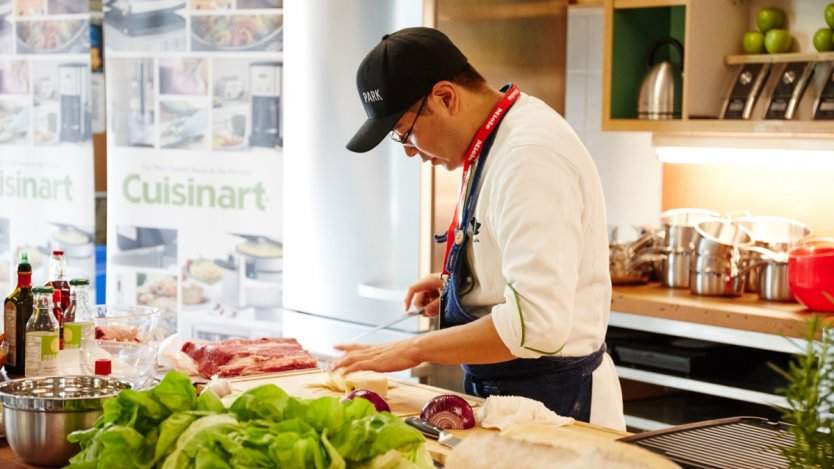Considering chef Antonio Park’s fame and notoriety, he has a calm and peaceful passion about him.
Born to Korean parents, but raised in South America before immigrating to Canada at 15 years old, Antonio Park speaks six languages fluently, has 23 years of toiling in kitchens all over the world under his belt, and is the first Canadian chef to receive a license for Kobe Beef. He owns and runs two of the hottest restaurants in Montréal--Park and Lavenderia--and judges on Chopped Canada. Park is the real deal, so we wanted to find out more about him and his style of cooking when he was at the inaugural Toronto Food & Wine Festival.
You’ve been in the kitchen with your mom since you were a young boy. Have you always dreamed of being a chef?
That wasn’t really my initial dream, but it’s something that has always been in my heart. Living in Argentina really made me want to be a soccer player. I wanted to be a singer and dancer, but my heart was true to food. I grew up in a family where my mom made everything. When we first moved to South America, it was still a third-world country. She didn’t have the right ingredients to cook her familiar cuisine. So, she had to use local ingredients and try to mix them to make Asian products, like Asian paprika and gochujang. She had to make everything from scratch.
A lot of the vegetables in Korea are dried first and then pickled, or marinated, or fermented after. So, I grew up watching my mom drying her own peppers in the sun, grinding them on a stone, making our own spices. But, these aren’t techniques that most home cooks know how to do, these are more chefs’ techniques. She always told me, “You’re not just making it, you’re putting love into it.” My mom is a huge influence on the reason why I became a cook.
It’s been said that there’s kimchi running through your veins, is there a little maple syrup in there too?
There’s a lot of maple syrup! I’ve changed all of my recipes and replaced the sugar in a lot of the Mirin we use to sweeten sauces and marinades. I can easily say I’ve replaced 95 per cent of the sugar we use with maple syrup. Even in my kimchi, I use maple syrup instead of sugar.
Do you feel that flavour profile really comes through in the rice?
Absolutely. Maple syrup isn’t as sweet as sugar; it’s a much more natural flavour. You’re actually exposing the rice rather than the sugar and vinegar; it’s a beautiful balance. I use honey, too. We have a 5,000-sq.-ft rooftop at Park and Lavenderia with a garden and beehives; I have 40,000 bees. We use our honey mixed with maple syrup to make our rice vinegar mix.
Why did you choose Montréal?
When I was almost 15, there was a South American crisis. My parents wanted to move to a country that would provide us with a better education and future. We immigrated to Vancouver first and then moved to Montréal. They wanted us to have the opportunity to learn another language because language is power. French was easy for us to pick up since we already knew Latin languages. I’m a proud Montréaler.
What is the weirdest or most challenging ingredient you’ve seen come out of a Chopped Canada basket?
Oooh, prairie oysters. I’m a guy who works with a lot of weird ingredients, there isn’t much that scares me. Sometimes we start shooting the show at 6 a.m. So, imagine prairie oysters, raw, at 6 a.m. That’s next level.
What basket of ingredients would you put together for your good friend Susur Lee?
Susur Lee! Um… Wow, he’s good. I have to be careful with this one! We treat each other like brothers. I think he’s the godfather of Asian cuisine in Canada; I have so much respect for him. I’d put something messy: sea cucumber or maybe monkfish liver! Okra, because it’s very South American. The final ingredient will be something more complicated, like a cheesecake, for an entree! Yes!
You’ve come from washing dishes in a Chinese buffet to being the first Canadian chef to receive a license for Kobe Beef. How does that feel?
I’ve been doing this for 23 years. Chopped Canada has really helped in getting my name out there, but I worked hard for 19 years before getting to this place. Being able to bring all of my cultures and culinary backgrounds together in my restaurants that have been really successful is a blessing. I’m a lucky one.
So, what’s next? A new restaurant? A seventh language?
My next project is focusing on restaurants in different cities, maybe going towards the West. I have very close friends in Calgary, I love it there.













